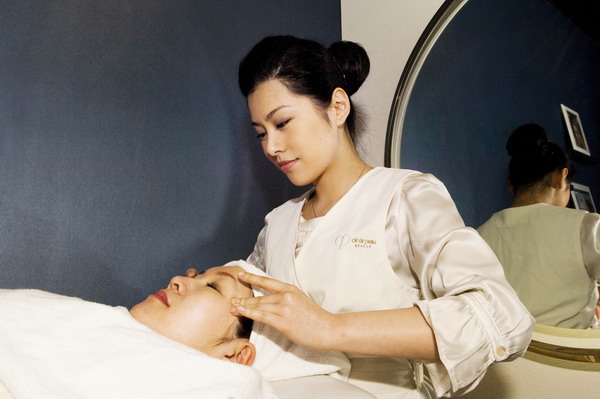Cosmetics brush off an economic slump
Updated: 2012-11-23 14:53
By Yao Jing (China Daily)
|
||||||||
Late last year, Shiseido began to sell its Pure&Mild brand products online. Early this year it began selling its products on Tmall.com. Its competitor, the online sales of Estee Lauder grew by 40 percent in China in the fourth quarter of fiscal year 2012. It is reaching online consumers in nearly 350 Chinese cities.
"Even though the online channel only accounts for a small percentage of sales, it is growing the fastest of all," Wang says. "Brands need to have a strong online store, either self-operated or through e-retailers as Tmall and 360buy."
In keeping up with market trends, Shiseido has maintained annual double-digit sales growth in China since 2004. Sales reached 89.1 billion yuan for the year that ended on March 31.
"China now accounts for 11 percent of our global business," says Yang Yan, general manager of the public relations department at Shiseido China Co Ltd.
|
 A tailored beauty service for members of the high-end brand Cle de Peau Beaute of Shiseido. [Photo/China Daily] |
Shiseido's beginnings in China goes back to 1981 when it sold about 60 imported products at large retail shops and hotels in Beijing. It launched Aupres, a brand exclusively for department stores in China, in 1994. The 140-year-old company established Shiseido China Co Ltd, a wholly-owned subsidiary, in Shanghai in 2003 after starting productions at a factory in Beijing and opening Shiseido China Research Center Co Ltd in Beijing.
"We have more understanding about local consumers and have also gone ahead in inventing special products for Chinese," says Yang explaining Shiseido's advantages in China.
Shiseido has also recently expanded its sales channels into specialty cosmetics stores that are more popular in lower-tier Chinese cities since 2004, selling mostly its Urara and Pure&Mild brands. It now has contracts with over 5,900 stores.
"It gives us a convenient way to have contact with consumers, especially in smaller cities," Yang says.
"I think one very important concept that can explain the success of a brand regardless of its origin is its sales channel strategy. Currently, the bulk of sales is still being done in department stores or retail stores such as Sephora."
"Asian brands are more focused on all-natural products that enhance appearance, for example, with hydrating lotions or skin whitening creams, which is very attractive to younger consumers in the 15-30 age group who are less focused on maintaining their youthful appearance."
But Mary Kay, the direct cosmetics seller, takes a different approach to building up sales in China. It emphasizes its customer service instead of simply expanding sales channels.
"We are arriving in homes to provide the service for each customer," says Paul Mak, president of Mary Kay's Greater China region. "Faced with the burgeoning online retail, we are just competing with other companies in the one-to-one and face-to-face service."
Mary Kay established its first overseas factory in Hangzhou, Zhejiang province, in 1995. It is now working on the second phase of its Hangzhou manufacturing center, believing that China will surpass the US to become its biggest market next year.
Mak says China has become Mary Kay's largest overseas market. He adds that what is crucial right now for its direct sales is the company's committed and productive independent sales force.
Its sales volume in China increased 55 times between 1999 and 2011 and its staff force tripled. Though it is sticking to its direct sales channels and to developing strong salespeople, it is also introducing innovative products to the market.
"Targeting big cities, we launched the higher-end product line TimeWise Plus in July as we realized that consumers in Beijing and Shanghai are paying more attention to premium goods because of the trading up and higher income," Mak says.
In smaller cities, Mary Kay is using a marketing strategy of sending out fleets of pink buses to introduce the line of products to consumers and allowing them to try the products.
Wang says customer service is very important for the cosmetics business and that cosmetics giants need to correctly train their sales staff, or beauty assistants, in how to recommend products and push sales.
"Many purchases are still impulse purchases, and many consumers want to learn more about products and will walk away if staff cannot inform them," Wang says.
Xu Junqian contributed to this story.
yaojing@chinadaily.com.cn

 Relief reaches isolated village
Relief reaches isolated village
 Rainfall poses new threats to quake-hit region
Rainfall poses new threats to quake-hit region
 Funerals begin for Boston bombing victims
Funerals begin for Boston bombing victims
 Quake takeaway from China's Air Force
Quake takeaway from China's Air Force
 Obama celebrates young inventors at science fair
Obama celebrates young inventors at science fair
 Earth Day marked around the world
Earth Day marked around the world
 Volunteer team helping students find sense of normalcy
Volunteer team helping students find sense of normalcy
 Ethnic groups quick to join rescue efforts
Ethnic groups quick to join rescue efforts
Most Viewed
Editor's Picks

|

|

|

|

|

|
Today's Top News
Health new priority for quake zone
Xi meets US top military officer
Japan's boats driven out of Diaoyu
China mulls online shopping legislation
Bird flu death toll rises to 22
Putin appoints new ambassador to China
Japanese ships blocked from Diaoyu Islands
Inspired by Guan, more Chinese pick up golf
US Weekly

|

|







